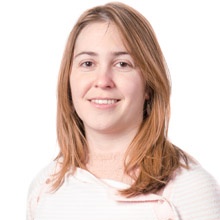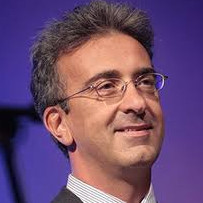
Topics
Deep Learning and Systems BiologyBiography
Pierre Baldi earned MS degrees in Mathematics and Psychology from the University of Paris, and a PhD in Mathematics from the California Institute of Technology. He is currently Distinguished Professor in the Department of Computer Science,
Director of the Institute for Genomics and Bioinformatics,
and Associate Director of the Center for Machine Learning and Intelligent Systems at the University of California Irvine. The long term focus of his research is on understanding intelligence in brains and machines. He has made several contributions to the theory of deep learning, and developed and applied deep learning methods for problems in the natural sciences such as the detection of exotic particles in physics, the prediction of reactions in chemistry, and the analysis of circadian rhythms in biology. He has written four books and over 350 peer-reviewed journal articles. He is the recipient of the 1993 Lew Allen Award at JPL, the 2010 E. R. Caianiello Prize for research in machine learning, and a 2014 Google Faculty Research Award. He is and Elected Fellow of the AAAS, AAAI, IEEE, ACM, and ISCB.
Talk
We will first provide a brief historical and conceptual overview of AI and deep learning. We will then demonstrate several applications of deep learning to problems in the biomedical sciences at multiple spatial and temporal scales, from the prediction of molecular properties to the analysis of biomedical images. Finally, we will conclude with a brief survey of some of the future technical and societal challenges for AI.
Biography
Riccardo Bellazzi, PhD, is chair of the Department of Electrical, Computer and Biomedical Informatics of the University of Pavia and director of the LISRC labs of the ICS Maugeri hospital in Pavia. His research interests range from artificial intelligence in medicine and machine learning to IT infrastructures to support clinical research in hospital. He is currently the technical project manager of the PULSE project, funded by the Horizon 2020 EU program.
Talk
Biomedical research can currently rely on a variety of novel molecular biology tools and on powerful data analytics techniques. Moreover, the availability of clinical data in electronic format holds the promise to link research with clinical practice, supporting on the one hand translational research and on the other hand hypothesis generation. However, integration of different IT systems for data collection, sharing and processing, as well as integration and fusion of different data types for analytics still represent a crucial challenge. The talk will report on state-of-art solutions in data integration as well as on lessons learned from on-field experience.

Biography
Cristina Yenyxe Gonzalez Garcia has a MSc in Parallel and Distributed Computing from the Polytechnic University of Valencia (Spain). She leads the European Variation Archive, a repository of open-access variants from any species developed at the European Bioinformatics Institute (EMBL-EBI), since 2015. Her main interests are facilitating data distribution and analysis, mainly via the standardization of variant normalization and representation. This led her to contribute to multiple file formats and APIs maintained by the Global Alliance for Genomics and Health (GA4GH).
Talk
The Global Alliance for Genomics and Health (GA4GH) is an international
organization seeking to enable responsible genomic data sharing. Since
2013, the GA4GH has defined and/or maintained standards for data
representation and exchange. These span from widely used file formats
such as BAM and VCF, to newly developed APIs for data streaming and
reference sequences retrieval. Combined together, all these tools grant
more homogeneous access to a great number of resources like the European
Nucleotide Archive (ENA), national initiatives in the UK, US and Canada,
etc. This talk will introduce the audience to the GA4GH, and many of the
specifications this organization has defined, what is their purpose and
how they can be combined in order to facilitate genomic data sharing and
analysis.
